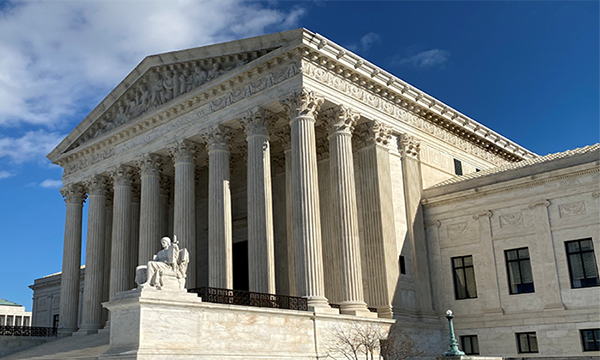The U.S. Supreme Court’s deadlock on the constitutionality of religious charter schools did not resolve that contentious issue but it did encourage– indirectly– religious organizations to try, try again.
 On Thursday, the Justices split 4-4 in Oklahoma Charter School Board v. Drummond, which would have established the first, direct taxpayer-funded religious charter school in the nation. The Oklahoma Supreme Court, agreeing with the state’s attorney general, had ruled that approval of the St. Isidore of Seville Virtual Charter School violated the state constitution, state law, and the First Amendment’s establishment clause.
On Thursday, the Justices split 4-4 in Oklahoma Charter School Board v. Drummond, which would have established the first, direct taxpayer-funded religious charter school in the nation. The Oklahoma Supreme Court, agreeing with the state’s attorney general, had ruled that approval of the St. Isidore of Seville Virtual Charter School violated the state constitution, state law, and the First Amendment’s establishment clause.
St. Isidore was to be run as a Catholic School, with religion and an evangelizing mission fully incorporated into the curriculum. The Oklahoma constitution requires the state to establish a system of public schools open to all children in the state and “free from sectarian control.”
A 4-4 split became possible when Justice Amy Coney Barrett, who has been a reliable vote for the conservative majority’s push for a greater role for religion in the public square, chose not to participate in the case. Although Barrett gave no reasons for her “recusal,” there was speculation that she stepped aside because of her close friendship with a Notre Dame law professor who has been a leading advocate of religious charter schools as well as the role of the Religious Liberty Clinic at Notre Dame Law School, which was a counsel in the case. Barrett taught at the law school before becoming a judge.
But even with that potential for a deadlock, a majority of Justices– all conservatives– appeared inclined during oral arguments on April 30 to endorse the religious charter school. In a trio of recent rulings, the six-justice conservative majority had ruled that if a state offers a benefit to private organizations or bodies, such as schools, it may not discriminate on the basis of religion.
St. Isidore and the state’s charter school board, which had approved a charter school contract for St. Isidore, strongly relied on those recent rulings. The arguments focused heavily on whether charter schools were private or public schools.
The attorney general argued that charter schools were public schools because they followed state curriculum requirements and achievement standards and could be audited and shut down by the state even if managed by a private board or organization. St. Isidore countered that they were private because of private management and were allowed to organize around themes such as languages, sports, STEM and anything but religion. That discrimination violated the First Amendment’s free exercise of religion clause.
Justice Brett Kavanaugh showed his hand during arguments when he said: “All the religious school is saying is, ‘Don't exclude us on account of our religion.’ And when you have a program that's open to all comers except religion, that seems like rank discrimination against religion.”
On the other side, Justice Elena Kagan said charter school characteristics look like public schools and have always been considered public schools. She noted that the diocese and parish seeking the religious charter school had modified the standard charter school contract to accommodate church autonomy principles and other contract items. She cautioned that if approved, there would be “a line out the door” of other religious organizations seeking taxpayer-funded religious charter schools.
The Justice whose feelings were hardest to discern was Chief Justice John Roberts Jr., a master at quizzing both sides and generally without revealing which side he might favor. The court’s 4-4, unsigned opinion simply stated that the Oklahoma Supreme Court’s decision stands and the 4-4 opinion has no precedential value going forward.
But it does have some value to those religious groups advocating religious charter schools.
What Roberts may be thinking, along with Barrett’s recusal and future participation, are reasons why religious organizations are likely to try again to seek charter school approvals. Forty-six states, including Oklahoma, have charter schools that under federal charter school law and state law are taxpayer-funded public schools required to be non-sectarian.
The high court has two other religion-related cases awaiting decision this term. In Mahmoud v. Taylor, a group of parents of different religious backgrounds sued the Montgomery County, Maryland, public school board when it eliminated notice and opt-out options for parents who did not want their children participating in lessons involving LGBTQ-inclusive “Storybooks” in the English Language arts curriculum. The parents argued that the denial of notice and opt-out violated their free exercise of religion and their parental rights.
And Catholic Charities Bureau v. Wisconsin Labor & Industry Review Commission is an appeal by Catholic Charities of a Wisconsin Supreme Court decision upholding a denial of an exemption from the state’s unemployment tax. The state court held that Catholic Charities (an arm of the Catholic diocese) was not “operated primarily for religious purposes” as required for the tax exemption under the state statute, and its activities, instead, were “primarily charitable and secular” rather than religious.
Marcia Coyle is a regular contributor to Constitution Daily and PBS NewsHour. She was the Chief Washington Correspondent for The National Law Journal, covering the Supreme Court for more than 30 years.







